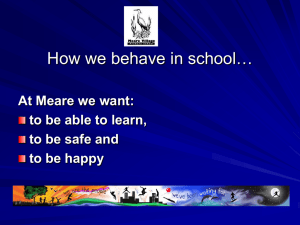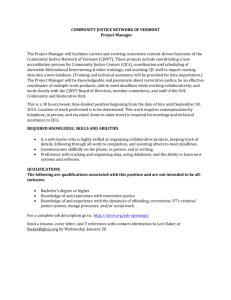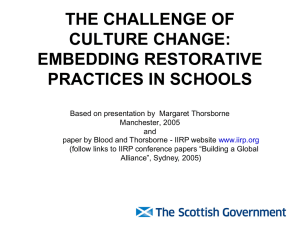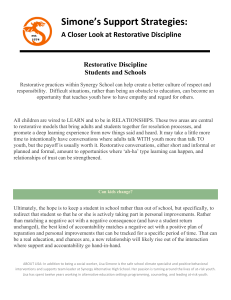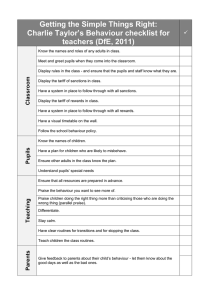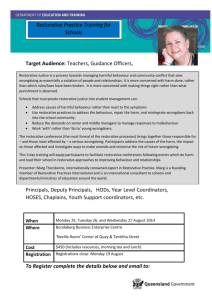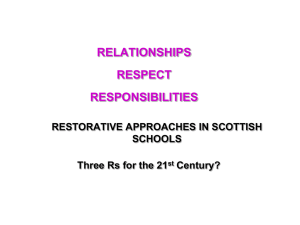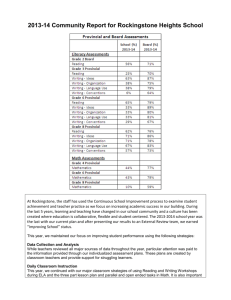Restorative Justice About Restorative Language How do restorative approaches
advertisement
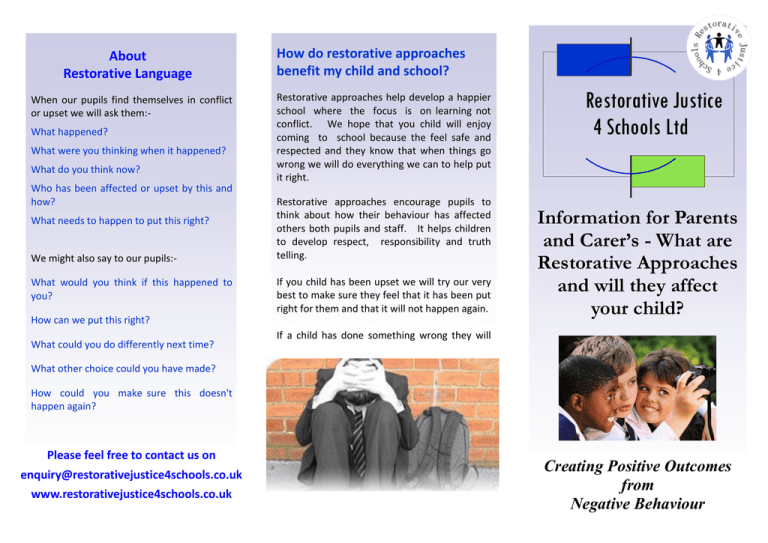
About Restorative Language When our pupils find themselves in conflict or upset we will ask them:What happened? What were you thinking when it happened? What do you think now? Who has been affected or upset by this and how? What needs to happen to put this right? We might also say to our pupils:What would you think if this happened to you? How do restorative approaches benefit my child and school? Restorative approaches help develop a happier school where the focus is on learning not conflict. We hope that you child will enjoy coming to school because the feel safe and respected and they know that when things go wrong we will do everything we can to help put it right. Restorative approaches encourage pupils to think about how their behaviour has affected others both pupils and staff. It helps children to develop respect, responsibility and truth telling. If you child has been upset we will try our very best to make sure they feel that it has been put right for them and that it will not happen again. How can we put this right? What could you do differently next time? Restorative Justice 4 Schools Ltd Information for Parents and Carer’s - What are Restorative Approaches and will they affect your child? If a child has done something wrong they will What other choice could you have made? How could you make sure this doesn't happen again? Please feel free to contact us on enquiry@restorativejustice4schools.co.uk www.restorativejustice4schools.co.uk Creating Positive Outcomes from Negative Behaviour Restorative Approaches Your son or daughter ’s primary school have started to use Restorative Approaches to help them improve behaviour and build community. We hope this leaflet will help you understand some of the things your child might come home and talk to you about. They may tell you that their class are working together to build strong community and develop good language skills. To help them do this we have introduced some new ideas, our pupils will now check in and check out at different times of the day or week. When we check in and check out we will sit together in a circle and everyone will be able to say something about themselves and how they are feeling. You might notice a difference in the language that is used in school. Restorative language is a fair, respectful way of speaking to each other and we will expect everyone within school to use it - both staff and pupil - and we hope that you will respect this when you come into school. We may develop a Peer Mentoring/Mediation scheme within school and your child may be invited to take part, or may wish to speak to a Peer Mentor/Mediator if they are concerned about something at school. A pupil may be asked to attend a Restorative Justice Conference if they are having a conflict at school. This is a meeting with everyone involved to: Discuss what is happening Look at who has been affected or upset Decide how it can be put right Find a way forward You may also be invited to attend a conference if it is felt that it would be helpful for your child that you were there. Restorative Justice Conferencing is not new. Many schools have used it for over 20 years and it has been proved that it helps school improved behaviour and develop respect, responsibility and truth telling. Schools that use this approach have found that they have been able to: - in a way that is fair to everyone To make sure that those who have been using poor behaviour can be held accountable they will be expected to take responsibility for their actions before the meeting starts. This allows the school to: Help pupils who have been upset by others poor behaviour by expecting wrong doers to put right the upset they have caused. Help pupils involved in poor behaviour so they are able to change their behaviour in a way that also holds them fully responsible. During a conference a contract is made, this will list of actions or promises that they need to agree to carry out so the conflict can be put right and doesn't happen again. Someone within school will make sure that everyone is keeping to the contract. Reduce Exclusions Disruptive behaviour Conflict Bullying Improve Behaviour Learning Attendance Develop Truth Telling Responsibility Accountability Empathy Emotional Literacy Conflict Resolution Skills Positive Learning Environment
